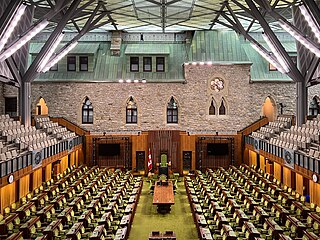Related Research Articles

The Parliament of the United Kingdom of Great Britain and Northern Ireland is the supreme legislative body of the United Kingdom, and may also legislate for the Crown Dependencies and the British Overseas Territories. It meets at the Palace of Westminster in London. Parliament possesses legislative supremacy and thereby holds ultimate power over all other political bodies in the United Kingdom and the Overseas Territories. While Parliament is bicameral, it has three parts: the sovereign, the House of Lords, and the House of Commons. The three parts acting together to legislate may be described as the King-in-Parliament. The Crown normally acts on the advice of the prime minister, and the powers of the House of Lords are limited to only delaying legislation.

The House of Commons of Canada is the lower house of the Parliament of Canada. Together with the Crown and the Senate of Canada, they comprise the bicameral legislature of Canada.

The Parliament of Canada is the federal legislature of Canada, seated at Parliament Hill in Ottawa, and is composed of three parts: the King, the Senate, and the House of Commons. By constitutional convention, the House of Commons is dominant, with the Senate rarely opposing its will. The Senate reviews legislation from a less partisan standpoint and may initiate certain bills. The monarch or his representative, normally the governor general, provides royal assent to make bills into law.
An act of parliament, as a form of primary legislation, is a text of law passed by the legislative body of a jurisdiction. In most countries with a parliamentary system of government, acts of parliament begin as a bill, which the legislature votes on. Depending on the structure of government, this text may then be subject to assent or approval from the executive branch.
A private member's bill is a bill introduced into a legislature by a legislator who is not acting on behalf of the executive branch. The designation "private member's bill" is used in most Westminster system jurisdictions, in which a "private member" is any member of parliament (MP) who is not a member of the cabinet (executive). Other labels may be used for the concept in other parliamentary systems; for example, the label member's bill is used in the Scottish Parliament and the New Zealand Parliament, the term private senator's bill is used in the Australian Senate, and the term public bill is used in the Senate of Canada. In legislatures where the executive does not have the right of initiative, such as the United States Congress, the concept does not arise since bills are always introduced by legislators.

Crossrail is a completed railway project centred on London. It provides a high-frequency hybrid commuter rail and rapid transit system, known as the Elizabeth line, that crosses the capital from suburbs on the west to east and connects two major railway lines terminating in London: the Great Western Main Line and the Great Eastern Main Line. The project was approved in 2007, and construction began in 2009 on the central section and connections to existing lines that became part of the route, which has been named the Elizabeth line in honour of Queen Elizabeth II who opened the line on 17 May 2022 during her Platinum Jubilee. The central section of the line between Paddington and Abbey Wood opened on 24 May 2022, with 12 trains per hour running in each direction through the core section in Central London.
Proposed bills are often categorized into public bills and private bills. A public bill is a proposed law which would apply to everyone within its jurisdiction. A private bill is a proposal for a law affecting only a single person, group, or area, such as a bill granting a named person citizenship or, previously, granting named persons a legislative divorce.

The parliamentary committees of the United Kingdom are committees of the Parliament of the United Kingdom. Each consists of a small number of Members of Parliament from the House of Commons, or peers from the House of Lords, or a mix of both, appointed to deal with particular areas or issues; most are made up of members of the Commons. The majority of parliamentary committees are select committees. The remit of these committees vary depending on whether they are committees of the House of Commons or the House of Lords.

Class 341 and Class 342 were proposed electric multiple unit classes from the Networker series, to be introduced in the late 1990s. The trains were planned to run on the Channel Tunnel Rail Link and Crossrail projects. Both projects were halted in the early 1990s, following the early 1990s recession. With the subsequent privatisation of British Rail in 1994, neither train was ordered.
The Hybrid Instruments Committee is a select committee of the House of Lords in the Parliament of the United Kingdom. The role of the committee is to look into all opposed hybrid instruments, and to advise the House as to whether it should appoint a select committee, similar to those appointed for opposed private bills, to scrutinise the instrument and the petition or petitions against it.
The Committee of Selection is a select committee of the House of Commons in the Parliament of the United Kingdom. Unlike the Commons' other select committees, the Committee of Selection exists by virtue of the House's Standing Orders for Private Business, its rules for bills that affect only specific organizations or individuals. Despite that, the committee is best known for appointing members of committees established under resolutions of the House and the Standing Orders for Public Business.

An Act of Parliament in the United Kingdom is primary legislation passed by the UK Parliament in Westminster, London.

The Crossrail Act 2008 is an Act of the Parliament of the United Kingdom that authorises the construction of the Crossrail railway from Maidenhead and Heathrow Airport to Shenfield and Abbey Wood. The legislation was introduced by the then Secretary of State for Transport Douglas Alexander and received royal assent on 22 July 2008. The Crossrail bill was introduced on 22 February 2005 and was carried over between sessions of Parliament on three occasions. Although public Bills generally pass through Parliament in a single session, this was a Hybrid Bill, which has the characteristics of both public and private bills and is subject to scrutiny in the same way as both a public and private bill, and generally takes longer to be considered. The last such hybrid bill introduced led to the Channel Tunnel Rail Link Act 1996.
In the UK and certain other Commonwealth countries, King's Consent is a parliamentary convention under which Crown consent is sought whenever a proposed parliamentary bill will affect the Crown's own prerogatives or interests. Prince's Consent is a similar doctrine, under which consent of the Prince of Wales must be obtained for matters relating to the Duchy of Cornwall. King's or Prince's Consent must be obtained early in the legislative process, generally before parliament may debate or vote on a bill. In modern times, following the tenets of constitutional monarchy, consent is granted or withheld as advised by government.

Scottish Parliament committees are small groups of Members of the Scottish Parliament (MSPs) who meet on a regular basis to scrutinise the work of the Scottish Government, conduct inquiries into subjects within their remit and examine legislation. Much of the everyday work of the Scottish Parliament is done by these committees.

Local and personal acts are laws in the United Kingdom which apply to a particular individual or group of individuals, or corporate entity. This contrasts with a public general Act of Parliament (statute) which applies to the nation-state. Acts of Parliament can afford relief from another law; grant a unique benefit or, grant powers not available under the general law; or, relieve someone from legal responsibility for some allegedly wrongful act.

An act of the Scottish Parliament is primary legislation made by the Scottish Parliament. The power to create acts was conferred to the Parliament by section 28 of the Scotland Act 1998 following the successful 1997 referendum on devolution.

The High Speed Rail Act 2017 is an Act of Parliament in the United Kingdom which authorises the construction of Phase One of High Speed 2, a high-speed railway between London and Birmingham. The Act was introduced to Parliament as a Hybrid Bill on 25 November 2013, and received royal assent on 23 February 2017.
The Crossrail line was first proposed in 1941. It was first proposed to Parliament in 1991 but was rejected. It was then proposed by the government as the Crossrail bill in 2005. Construction started in 2009 and, heavily delayed, the central section was opened by Elizabeth II on 24 May 2022 with full completion due in 2023.

The history of High Speed 2 is the background to the planned construction of High Speed 2 (HS2), a new high-speed railway in Great Britain that was originally planned to connect London, Birmingham, Manchester, Leeds and other cities in the UK.